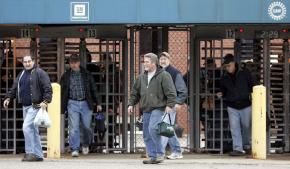Hidden in the UAW contract
When the United Auto Workers (UAW) announced a tentative deal with General Motors earlier this month, union President Bob King said that while the union failed to end two-tier wages, it "held the line" on pensions. But a closer look at the deal shows that the company and the union are preparing to carry out sweeping cuts in retirement pay after the contract is ratified.
, a retired 29-year veteran of General Motors and Delphi and a UAW activist, is the author of the forthcoming Autoworkers Under the Gun: Live Bait & Ammo from Haymarket Books, a collection of shop-floor newsletters he produced while at GM and Delphi.
WHEN YOU sign a blank check, you have to expect the worse. Or at least admit that you agreed to take the ride.
In 2003, the United Auto Workers (UAW) agreed to meet with auto parts maker Delphi after the contract ratification and negotiate a two-tier wage for new hires. Six months later, the UAW agreed that new hires would start at $14.50 per hour and never receive a pension. No one imagined the ride would be that rough.
In 2011, the UAW announced--for the first time since 1950--a new agreement with GM that did not include a raise in pensions for future retirees. One may argue that at a time when pensions are underfunded and GM is trying to hold down labor costs, the company and the union are justified in restricting raises on pensions.
The problem is that argument lacks investment savvy. Top-tier workers are replaced by second-tier workers making less than half as much. The turnaround on the investment is instantaneous. But GM wants more.
GM doesn't want to fund the pension. It's a drain on liquidity. And they have a plan to plug the drain. In a letter buried in the pension supplement, which is not distributed to UAW members, the UAW agreed to meet with GM after ratification and amend the pension plan so as to help GM improve its equity and liquidity.

If UAW members ratify the 2011 UAW-GM contract, they grant the union and the company permission to amend the pension. Just what that means is not clear, because it is not spelled out. What is clear is that it is open-ended, and UAW members, if they ratify the con, have agreed to go for the ride.
The letter states: "[T]he parties agreed that the national parties may mutually agree during the term of this agreement to amend the plan to add retirement options for some or all existing retirees to help GM reduce the volatility and risk related to the plan and benefit existing retirees by providing an additional voluntary option." See "Pension De-Risk Consideration: 2011 UAW-GM Supplemental Agreement Exhibit A (Pension Plan)," page 161.
The word "volunteer" leads to speculation that a buyout is on order. The danger with that scenario is that it may cause a run on the bank, and then the pension wouldn't be underfunded--it would be underwater.
But we shouldn't be thrown by a single word. Once you open Pandora's Box, they can amend the plan however the "parties" agree to "mutually agree." Isn't that cheerful language for a union contract? Parties agreeing to mutually agree? As retired UAW International Executive Board member Jerry Tucker said, "Sounds like they are on the same page of the same hymn book."
It's no wonder that when the Reuters news service wrote about this pension de-risk issue, they cited the Bible:
To take it completely off the table, you'd have to convert everybody to a 401(k) plan," said Peter Bible, a former GM chief accounting officer. He said such a deal would parallel the 2007 agreement with the union that relieved GM of its retiree health care obligations.
That's black and white, and between, there is somewhere where it will land," Bible, now a partner-in-charge at accounting firm EisnerAmper LLP added. "The idea is to limit the employer's exposure to the markets."
THE SOMEWHERE between "where it will land" is a cash-balance plan, with buyouts as an alternative.
What's a cash-balance plan?
A cash-balance plan is a legal maneuver for companies to reduce pension cost. Those eligible to retire will get a carrot that feels like a stick: get out now while the getting is good, because the best of times are over. Workers who are eligible to retire, but who choose to keep working, will not earn more pensions credits. They will lose out in the cash-balance shuffle, where time is stacked against them and the dealer cuts the deck.
Don't think they can do that? Why not? What's to stop them? UAW members volunteered to let them amend the plan, didn't they? A deal is a deal.
Older workers are typically grandfathered out, but there's always a lot of orphans when profiteers determine deferred compensation for workers is a promise worth breaking.
Here's how it broke down at IBM, as described by the New York Times: "The IBM plan allows the roughly 30,000 employees who have either 25 years at the company, or are 50 years old with a decade of service, to stick with the old plan."
Nonetheless, senior workers at IBM sought legal protection--and lost. As CNN reported: "The appeals court decision is likely to give companies the green light to implement cash-balance plans without fear of litigation."
How it breaks down at GM is anybody's guess. But three things are certain:
(1) The UAW is not informing members what they intend to do with the pension.
(2) Profit sharing is a hoax. Profit is what capital extracts from labor, not what it shares with labor. Shares are what CEOs are rewarded for screwing workers.
(3) A union leader who promotes profit-sharing as a way for workers to achieve economic justice is nothing but a corporate shill mutually agreeing to mutually screw both workers and retirees.


